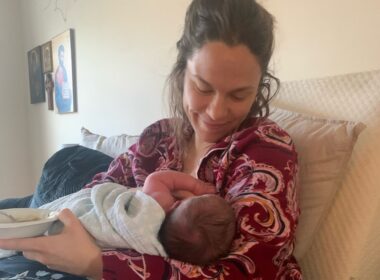They say it takes two to tango . . . and it also takes two to practice natural family planning, or NFP.
When using Fertility Awareness-Based Methods (FABMs) to achieve or avoid a pregnancy, making observations about basal body temperature, cervical mucus, or hormones detected in urine must fall to the woman in the relationship. But making decisions on how to use that information requires both people.
In the best-case scenario, both partners will be on the same page. But people grow and change, and total unity of mind isn’t always a thing in a real-life relationship. Even from the start, learning a FABM isn’t necessarily a unanimous decision.
So what do you do if your husband or partner isn’t on board?
Lisa Lomneth, Fertility Care Practitioner Intern (FCPI), has seen this situation play out. While she says typically it is the man who is “skeptical, not interested at all, or super nervous,” that’s not always the case. Either way, she says, “I always try to meet my clients where they are . . . I constantly try to call them into deeper relationship with each other.”
Elizabeth Mason, instructor of the Billings Ovulation Method, says the first thing she does when counseling a couple in this situation is to listen carefully to the concerns to understand what exactly the worries are. Then she makes sure to validate those thoughts and feelings, and not to discount them.
This acknowledgment and validation is something that the more gung-ho partner can do for the other, even without an outside party. Mason says it’s equally important to understand where this person is getting his or her information causing skepticism. Is the source reputable, or is the information secondhand? How much of the research is the concerned party aware of?
Both educators agree that the next step is to address those concerns with facts. FABMs are 98-99% effective at avoiding pregnancy, which is as good as, if not better than some forms of contraception. Truly, the only way to absolutely avoid pregnancy is to completely abstain from sex 100% of the time. Mason notes, however, that in most cases total abstinence is not healthy for a marriage.
She says it’s also important for couples to keep in mind that FABMs represent a daily picture of a woman’s overall health. If deciphering a woman’s chart is particularly challenging, it’s possible that there’s another health condition that needs to be addressed. For example, if a woman tracking cervical mucus is not getting adequate fat or water or is deficient in certain minerals, her body is not going to have what it needs to produce mucus. This is a situation which a certified instructor can suggest lifestyle changes to remedy.
Mason recommends that a partner or couple struggling with FABMs talk with couples who have been successful in achieving and avoiding pregnancy with their method, and who will be honest about the highs and lows of this lifestyle. They might be encouraged to consider the positives: the woman is not ingesting hormones whose side effects range from nausea to depression, nor is she carrying an IUD, which can be displaced and cause a perforation or other serious complications.
Another aspect of NFP that can be compelling for doubters is to focus on what’s natural to the human body. Lomneth says, “Especially at a time where we are so careful about what we put into our own bodies and the environment, it baffles me that people who want all organic, non-GMO, and eco-friendly [products] are willing to put [hormonal birth control] into their bodies.”
Lomneth focuses on the science of FABMs and says, “the knowledge [a woman] can gain about [her] body and the way it works while using NFP is also incredible. A husband may gain even more appreciation for [his] wife through use of NFP, because he better understands the way her body works.”
In this way, Lomneth emphasizes to couples, NFP provide the potential to deepen the couple’s relationship. A period of abstinence, she says, is “a different season” of a relationship, which offers an “opportunity to explore how our tenderness for one another goes beyond the physical act of sex.” Mason says these periods allow the couple to “truly appreciate the full gift that both people bring to marriage.”
“When a couple is fertile and wants to avoid pregnancy,” says Lomneth, “it is not a time to ignore one another or avoid each other.” She says, yes, sometimes it is difficult. “But with that challenge it can be so incredibly beautiful,” she says.
Ultimately, the decision to use FABMs should be one the couple agrees upon together, with the best interests of both the individuals and the relationship in mind. Even if the decision isn’t easy to make, simply making the choice may be an opportunity for deep and thoughtful conversation, which, when combined with the practice of NFP itself, is bound to make for a long-lasting and fulfilling relationship.
—
Natural Womanhood wants to know about difficulties you may have or currently be experiencing while practicing NFP and FABMs. Share your experience anonymously here.







